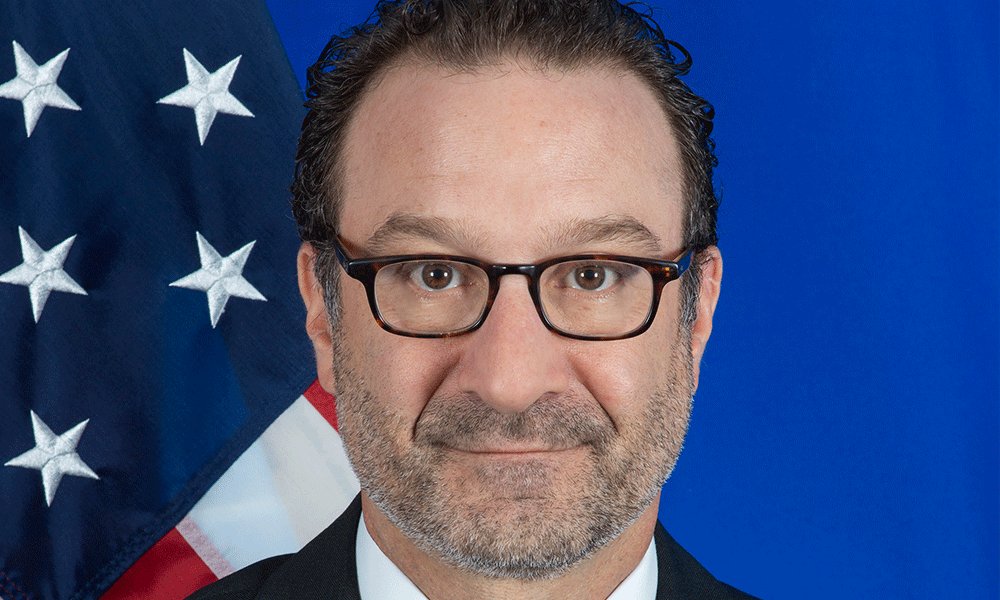عامٌ مضى، ولا يزال لبنان يمتنع عن مواجهة حزب الله
ديفيد شينكر/الشرق الأوسط/27 تشرين الثاني 2025
(ترجمة بحرية من الإنكليزية بواسطة الياس بجاني بالاستعانة بمواقع ترجمة متعددة)
A Year Later, Lebanon Still Won’t Stand Up to Hezbollah
David Schenker/Asharq Al-Awsat/November 27/2025
Just days before the one-year anniversary of the Israel-Hezbollah ceasefire, the government of Lebanon announced that it would provide official disability cards and full benefits to thousands of Hezbollah members injured in Israel’s now-famous September 2024 covert operation detonating pagers belonging to the Lebanese militia group. The Trump administration criticized Beirut’s decision to extend a social safety net for some Hezbollah members, and the initiative was hurriedly rolled back. But that aborted decision highlights a troubling dynamic in Lebanon more than a year after Israel smashed Hezbollah and decapitated its leadership.
The Lebanese government’s continued extreme deference to Hezbollah suggests a Beirut-based variant of the Stockholm Syndrome. On November 27, one year after the ceasefire, few will celebrate the faltering truce. On Sunday, Israel said it had killed Hezbollah’s chief of staff in an airstrike outside Beirut. That strike was yet another reminder that Lebanon has fallen well short of its own promises to disarm Hezbollah and enforce the rule of law—and isn’t likely to do much better.
Lebanon felt far more hopeful in January 2025, when its newly elected president, Joseph Aoun, pledged in his inaugural speech to take away Hezbollah’s guns and ensure that his government’s writ extended to the whole country. Scant progress has been made on either front. Efforts by the Lebanese Armed Forces (LAF) to disarm the battered but still-dangerous militia have stalled. Hezbollah has threatened to reignite Lebanon’s civil war should the army persist in collecting its weapons. The intimidated LAF now studiously avoids searching so-called “private property” where Hezbollah stashes most of its arsenal. Meanwhile, both the Lebanese government and military protest Israel’s repeated strikes targeting these Hezbollah arms caches.
Ten months into its mandate, Aoun’s government has also proved reticent to pursue justice and accountability for militias and common criminals alike. Most prominently, no discernable progress has been made on the investigation and prosecution of those responsible for the 2020 Beirut port explosion, which killed more than 200 people, injured more than 6000, and displaced some 300,000.
Ultimately, a host of former government officials should be held responsible for improperly storing nearly 3,000 metric tons of ammonium nitrate in the capital. But Beirut isn’t pursuing the case, in part because Hezbollah has been credibly implicated in the blast. Not only did the militia control the harbor, but the organization was widely suspected of diverting some of the ammonium nitrate to Bashar al-Assad’s Iran-backed regime in Syria to fuel the barrel bombs that he deployed against his own citizens during Syria’s bloody civil war.
Hezbollah’s alleged involvement in the port tragedy was first surfaced by Lebanon’s most prominent shiite critic of the militia, the activist and writer Lokman Slim. In January 2021, he gave a television interview implicating Hezbollah in the explosion. Twenty days later, he was assassinated in south Lebanon, Hezbollah’s stronghold. The police never adequately investigated the murder, and Lebanon’s highly politicized judiciary was disinclined to proceed. The case has recently been reopened due to pressure from his German national widow, but isn’t moving forward.
Indeed, since the 2005 murder of former Lebanese prime minister Rafiq Hariri, Hezbollah is widely believed to have assassinated more than a dozen Lebanese politicians, journalists, and law enforcement officials investigating these crimes. Not a single alleged perpetrator has been held to account in Lebanon. That wasn’t surprising during previous Hezbollah-adjacent administrations, but it is more jarring during the nearly year-long tenure of the current government, which calls itself reformist even as it continues the long tradition of state impunity.
Lebanon isn’t administering justice to Hezbollah murderers, but Israel is. In November 2024, Israel killed a Hezbollah operative named Yahya Ayyash in an airstrike in Syria. Ayyash, a member of Hezbollah’s Unit 121 assassination squad, was the sole assailant convicted in 2020 by the independent Special Tribunal for Lebanon for his role in the Hariri bombing. Earlier this month, Israel released information on the social-media platform X (formerly Twitter) detailing Hezbollah’s alleged August 2023 killing of the anti-Hezbollah politician Elias Hasrouni, who was abducted and poisoned by Unit 121.
To be sure, disarming Hezbollah is dangerous business—but that’s what Lebanon committed to in its ceasefire agreement with Israel. Beirut’s primary objective increasingly seems to be avoiding a confrontation with the militia. Threats from the Trump administration to withhold US military assistance or impede postwar construction are unlikely to compel—largely due to the more proximate fear of violence—the Aoun government or the LAF to act. So Israel is doing the job—following through on Aoun’s inaugural pledges and the state’s ceasefire commitments. Despite official Lebanese complaints about Israeli airstrikes, Lebanon’s national security apparatus actually prefers this division of labor.
Following Israel’s ferocious fall 2024 assault on Hezbollah, Washington had high hopes for Lebanon. It would be best to lower them. The Trump administration should continue to press the Lebanese government to seize Hezbollah’s weapons and empower Lebanon’s timorous judiciary to investigate and prosecute the backlog of assassinations allegedly perpetrated by the militia. But if past is prologue, Lebanon—still cowed by Hezbollah—will continue to disappoint.
*David Schenker, who served as assistant secretary of state for Near Eastern affairs from 2019-21, is a senior fellow at the Washington Institute and the director of its program on Arab politics.
عامٌ مضى، ولا يزال لبنان يمتنع عن مواجهة حزب الله
ديفيد شينكر/الشرق الأوسط/27 تشرين الثاني 2025
(ترجمة بحرية من الإنكليزية بواسطة الياس بجاني بالاستعانة بمواقع ترجمة متعددة)
قبل أيام قليلة من الذكرى السنوية الأولى لوقف إطلاق النار بين إسرائيل وحزب الله، أعلنت الحكومة اللبنانية أنها ستمنح بطاقات إعاقة رسمية ومزايا كاملة لآلاف من عناصر حزب الله الذين أُصيبوا خلال العملية الإسرائيلية السرّية الشهيرة في سبتمبر 2024، والتي فجّرت أجهزة النداء (Pagers) التابعة للميليشيا. وقد انتقدت إدارة ترامب قرار بيروت بتوسيع شبكة الأمان الاجتماعي لتشمل بعض عناصر حزب الله، فسارعت الحكومة إلى التراجع عنه. إلا أن هذا القرار المجهض يسلط الضوء على ديناميكية مقلقة في لبنان بعد أكثر من عام على سحق إسرائيل لحزب الله وقطع رأس قيادته.
إن استمرار الخضوع المفرط من جانب الحكومة اللبنانية لحزب الله يشير إلى نسخة بيروتية من “متلازمة ستوكهولم”. ففي 27 نوفمبر، وبعد عام على وقف إطلاق النار، لن يجد كثيرون ما يحتفلون به في هدنة تتصدّع يومًا بعد يوم. ويوم الأحد، أعلنت إسرائيل أنها قتلت رئيس أركان حزب الله في غارة جوية خارج بيروت، في تذكير جديد بأن لبنان فشل في الوفاء بوعوده لنزع سلاح حزب الله وفرض سيادة القانون—ولا يبدو أن أداءه سيتحسن.
كان الأمل أكبر بكثير في يناير 2025، عندما تعهّد الرئيس المنتخب حديثًا، جوزيف عون، في خطاب القسم بنزع سلاح حزب الله وبسط سلطة الدولة على كامل الأراضي اللبنانية. لكن التقدم ظل شبه معدوم على الجبهتين. فقد تعثرت جهود الجيش اللبناني (LAF) لنزع سلاح الميليشيا التي أُنهكت ولكنها لا تزال خطرة. وهدّد حزب الله بإعادة إشعال الحرب الأهلية إذا أصرّ الجيش على جمع أسلحته. أما الجيش المذعور، فأصبح يتجنب بشكل صارم تفتيش ما يُسمى بـ”الأملاك الخاصة” حيث يخزن حزب الله معظم ترسانته. وفي الوقت نفسه، تحتج الحكومة والجيش على الضربات الإسرائيلية المتكررة التي تستهدف هذه المخازن.
وبعد عشرة أشهر من توليها الحكم، تُثبت حكومة عون أيضًا تردّدها في السعي لتحقيق العدالة والمساءلة—سواء في مواجهة الميليشيات أو المجرمين العاديين. والأبرز أنه لم يُحرَز أي تقدم فعلي في التحقيق ومحاكمة المسؤولين عن انفجار مرفأ بيروت عام 2020، الذي أودى بحياة أكثر من 200 شخص، وأصاب أكثر من 6000، وشرّد نحو 300 ألف.
ومن المفترض أن يُحاسب عدد كبير من المسؤولين السابقين على تخزين نحو 3000 طن متري من نترات الأمونيوم بشكل غير قانوني في العاصمة. لكن بيروت لا تحرك الملف، جزئيًا بسبب تورط حزب الله المحتمل. فالميليشيا لم تكن تسيطر على المرفأ فحسب، بل كان يُشتبه أيضًا بأنها كانت تحول جزءًا من النترات إلى نظام بشار الأسد المدعوم من إيران في سوريا، لاستخدامه في البراميل المتفجرة خلال الحرب الأهلية الدموية.
وقد أثار أول اتهام علني لحزب الله في قضية المرفأ أبرزُ ناقد شيعي للميليشيا، الناشط والكاتب لقمان سليم. ففي يناير 2021، أدلى بتصريح تلفزيوني أشار فيه إلى تورط حزب الله. وبعد عشرين يومًا اغتيل في جنوب لبنان، معقل الحزب. ولم تحقق الشرطة بجدية، كما رفض القضاء اللبناني المسيّس المضي قدمًا. ورغم إعادة فتح الملف مؤخرًا بضغوط من أرملته الألمانية، إلا أنه لا يتقدم فعليًا.
والواقع أنه منذ اغتيال رئيس الحكومة الأسبق رفيق الحريري عام 2005، يُعتقد على نطاق واسع أن حزب الله اغتال أكثر من اثني عشر سياسيًا وصحافيًا ومسؤولًا أمنيًا لبنانيًا كانوا يحققون في هذه الجرائم. لم يُحاسَب أي متهم محتمل. ورغم أن هذا الأمر لم يكن مستغربًا في ظل الحكومات السابقة الموالية لحزب الله، فإنه يثير القلق بشكل أكبر في ظل حكومة تصف نفسها بالإصلاحية فيما تواصل نهج الإفلات من العقاب.
لبنان لا يُطبّق العدالة على قتلة حزب الله، لكن إسرائيل تفعل ذلك. ففي نوفمبر 2024، قتلت إسرائيل عنصر حزب الله يحيى عياش في غارة جوية في سوريا. وكان عياش، وهو عضو في وحدة الاغتيالات التابعة لحزب الله “الوحدة 121″، المهاجمَ الوحيد الذي أدانته المحكمة الدولية الخاصة بلبنان عام 2020 لدوره في اغتيال الحريري. وفي وقت سابق من هذا الشهر، نشرت إسرائيل معلومات على منصة X (تويتر سابقًا) توضح ما وصفته بعملية قتل السياسي المناهض لحزب الله إلياس الحصروني في أغسطس 2023 على يد حزب الله، بعد أن اختطفته الوحدة 121 وسمّمته.
إن نزع سلاح حزب الله عمل خطير بلا شك—إلا أن لبنان التزم به في اتفاق وقف إطلاق النار مع إسرائيل. ويبدو أن الهدف الأولي لبيروت هو تجنب المواجهة مع الميليشيا. وليس من المرجح أن تدفع تهديدات إدارة ترامب بوقف المساعدات العسكرية الأميركية أو عرقلة جهود إعادة الإعمار—بسبب الخوف الأقرب من العنف—حكومة عون أو الجيش للتحرك. وهكذا تقوم إسرائيل بالمهمة نفسها، استكمالًا لتعهدات عون والتزامات الدولة في اتفاق الهدنة. وبرغم الشكوى الرسمية من الغارات الإسرائيلية، يبدو أن الأجهزة الأمنية اللبنانية تفضّل هذا “تقاسم الأدوار”.
بعد الحملة الإسرائيلية العنيفة على حزب الله في خريف 2024، علّقت واشنطن آمالًا كبيرة على لبنان. لكن من الأفضل خفض هذه التوقعات. يجب على إدارة ترامب مواصلة الضغط على الحكومة اللبنانية لمصادرة أسلحة حزب الله وتمكين القضاء اللبناني المتردد من التحقيق في قائمة الاغتيالات المتراكمة المنسوبة إلى الميليشيا. ولكن إذا كان الماضي مؤشرًا على المستقبل، فإن لبنان—الذي ما زال مرعوبًا من حزب الله—سيستمر في إثارة الخيبة.
**ديفيد شينكر، الذي شغل منصب مساعد وزير الخارجية لشؤون الشرق الأدنى بين 2019 و2021، زميل في معهد واشنطن ومدير برنامجه للسياسات العربية.






















